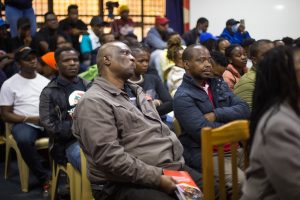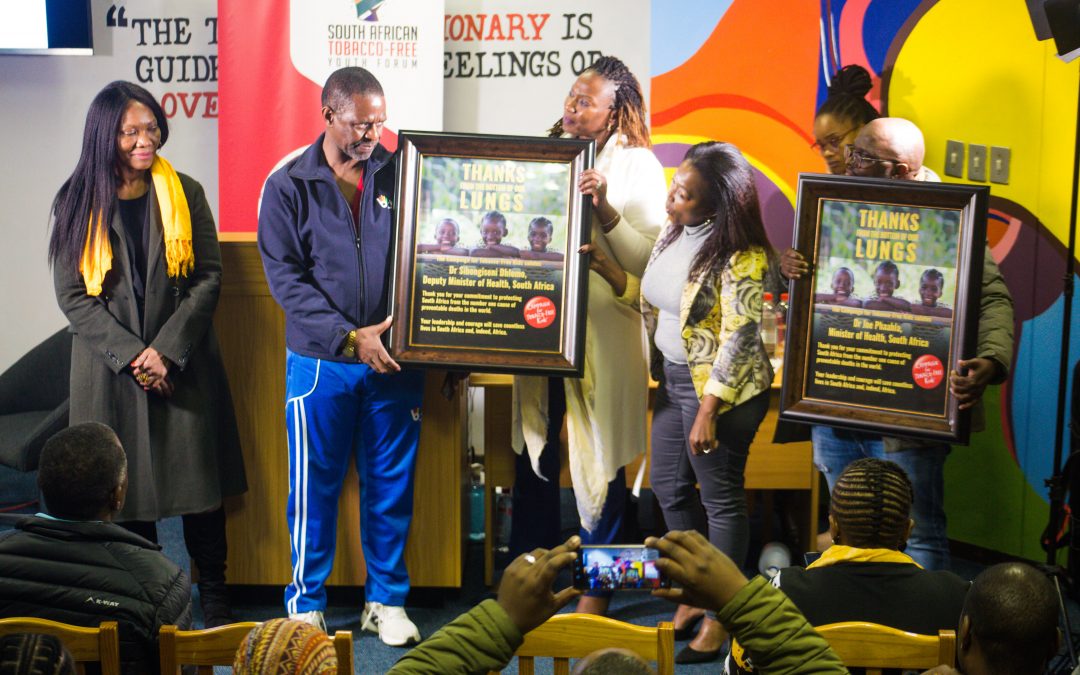Electronic cigarettes cannot be accepted let alone categorized as a harm reduction,’ Phindile Ngobese, SAMRAC
By Xolisile Dlou
The South African Tobacco-Free Youth Forum (SATFYF), in collaboration with Tshwane University of Technology (TUT), hosted a Youth for Tobacco Control Imbizo on July 26 at TUT Pretoria Campus. Themed “The Harsh Reality of Tobacco for South Africa’s Youth,” the goal was to reframe and correct the youth’s perceptions of tobacco products and their use. However, the Imbizo was intended to focus on the Tobacco Bill of 2018 (TC Bill) to sensitize the youth on its importance, thus amplifying youth voices to push for the TC Bill’s prioritization.


“What is the point of saying vending machines don’t have to sell cigarettes if parents will send a nine-year-old to the shop to buy cigarettes?” said the Deputy Minister of Health, Dr Sibongiseni Dhlomo. “We must think about that. Do we allow parents to send like 10-year-olds to buy cigarettes, and when the young star comes back with the cigarette, the dad smiles,” he said. He added that this encourages young people to start smoking at an early age. He further emphasized that there should be a “no-sale” policy.
He further explained that the Bill was past the public hearing phase and would be first on the (the forum of the generals in the old cabinet) FOSAD/s agenda on the first of August. “Once it is accepted by FOSAD then it becomes the agenda for the public, supported by all cabinet members. Just like now, we are waiting for the exit of the NHIV from parliament, so this one must go into parliament. Therefore, you speak to any member of parliament in your area. I am one of them. You say, ‘member of parliament support the Bill’ We must push the members of parliament,” he said.
Tshwane University of Technology’s Dr. Annah Sefoloshoa, TUT representative said it’s terrible that young people encounter so many obstacles as a result they’ll require support, particularly with the SATFYF initiative (Anti-Tobacco Campaign). “Tobacco is a subject that is less talked about simply because the effects are not immediate; they are latent. So, we don’t see the effects immediately that your lungs will be black. You will only see that once you are aging or in the long run. So, I believe that today, with the initiative we have started, the students that are here will learn from this initiative and will be ambassadors,” she said.


The audience was informed about electronic cigarettes by Phindile Ngobese from SAMRC. “Scientists were able to prove that tobacco or cigarettes are dangerous to health. The US Surging General 1964, which was a smoking and health report, stated that tobacco is so dangerous it can cause cancer, cardiovascular diseases, and lung diseases, so now the tobacco industry was in trouble because their big secret about tobacco products was exposed,” she explained.
She went on to say that “currently, we are on the fourth generation of the modern electronic cigarettes that you see today. They were invented by a Chinese pharmacist. He was a smoker as well, and he wanted to quit because his father was also a smoker and he died due to tobacco-related illnesses. He invented the e-cigarette, but he is now a dual user, meaning he smokes both traditional cigarettes and electronic cigarettes,” she explained. She concluded by saying that electronic cigarettes cannot be accepted, let alone classified as harm reduction.
Zinhle Ngcobo, SAMRAC, said “most e-cigarettes contain nicotine, and nicotine has been proven to be highly addictive. It is also believed to cause an increased risk of lung damage, lung cancer, and other diseases.” She further explained that it carries a high risk of lung cancer. “A lot of users have this perception that they can quit smoking cigarettes through using e-cigarettes. However, research has found that it can actually act as a gateway to smoking marijuana,” she said.
She continued by stating that the tobacco and nicotine industries work very hard to promote the idea that electronic cigarettes are superior to traditional cigarettes and that many people tend to believe this because of the way the products look and the variety of colours that they come in. She concluded by stating that e-cigarettes are not safer than traditional cigarettes, they are ineffective at aiding smokers in quitting, and that those who attempt to quit smoking traditional cigarettes end up switching to dual use, which involves using both traditional cigarettes and e-cigarettes concurrently.
Thato Mmako, Tshwane Cluster Spokesperson, said that “The Constitution of the Republic of South Africa Chapter 2 Section 24 says that everyone has a right to an environment that is not harmful to their health or wellbeing and to have the environment protected for the benefit of present and future generations through reasonable legislative and other measures that prevent pollution, ecological degradation, and promote conservation, and secure ecologically sustainable development and those of natural resources while promoting justifiable economic and social development.”


He went on to say that most of the chemicals within tobacco or cigarettes are very dangerous and that whenever cigarette buds are thrown on the streets when it rains, the cigarette buds go to the rivers and pollute the water. He added that he believes the tobacco industry must be prosecuted because it is violating the Bill of Rights in South Africa. He concluded by saying that tobacco products infringe on Chapter 2 of the Constitution, Section 11, the right to life. “Young people must champion this policy to fight the power dynamic of the industry as they recruit through the entertainment industry and through platforms where young people are influenced,” he said.
Ingrid Bame, SATFYF Campaigns Manager, touched on the five key elements within the Tobacco Control Bill of 2018. She further said that “we actually have the power to pass the Tobacco Bill as youth. Think about it. We are a generation that came from fees that must fall. We are the ones who went all the way to the Union Buildings telling them that we need a free education in this country. If we are able to do that, who says that we can’t protect ourselves by passing this bill, who says that we can’t make a noise in front of the president of the country and say, Sir, come on put rules in place to safeguard us?” She explained.



